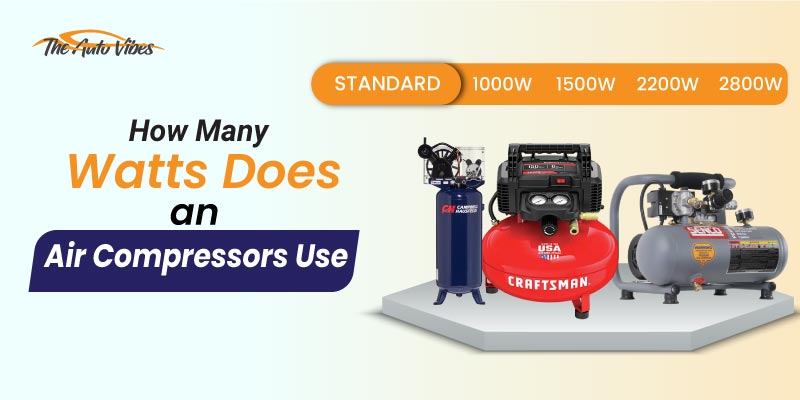Whether you’re planning to switch to a new air compressor or buying one for the first time to support your work, it is important to know about the power requirements of the air compressors.
There is no hard and fast answer to how much power an air compressor needs. Usually, small and transportable compressors require running power as low as 300 watts to 1500 watts. In comparison, big industrial-scale air compressors can use up to 7500 to 10,000 running watts.
It depends on the purpose of your purchase, along with the type, size, and configuration specific to that air compressor. Keep reading to find out more about this!
How Many Watts Does An Air Compressor Use?
An air compressor is a machine that offers both domestic and commercial support based on its capacity and configuration. You can’t just buy an air compressor without paying attention to the details first.
Unless it is to cater to your simple, small-scale household experiments, you need to know the exact power requirements of the specific air compressor before buying it.
To reiterate, small and easily transportable air compressors can require running power of 300-1500 watts. In contrast, big industrial-scale air compressors can use up to 7500-10,000 running watts.
In most cases, the starting and running watts of an air compressor are already given on the label or metal plate of the machine. You need to carefully check them to learn about the power requirements.
However, in some cases, you may only get the amperage reading on the machine. But don’t worry; you can calculate both the running and starting wattage from this.
Here is a table depicting a range of running and starting watts based on the engine’s power for different air compressors.
| Air Compressor | Running watt | Starting watt |
|---|---|---|
| 0.5 HP air compressor | 1000 watts | 2000 watts |
| 1 HP air compressor | 1500 watts | 4500 watts |
| 1.5 HP air compressor | 2200 watts | 6000 watts |
| 2 HP air compressor | 2800 watts | 7770 watts |
Types of Air Compressors Based On Size and Their Power Consumptions
There are different types of air compressors available on the market. You should know about them to choose the right one for your job.
Since we’re discussing power consumption, let’s find out how much power different types of air compressors require based on their size and usage.
1- Small, portable air compressor
These are the most handy air compressors out there. They are small, portable, and super beginner-friendly. You can use it to support your creative endeavors or simple home-upgrading projects.
The small household air compressors use around 500-2000 watts of running power. You can run them by simply connecting them to the regular power outlets at your home.
2- Mid-range air compressor
You can’t overlook the benefits of a medium-sized air compressor. It is bigger and more powerful compared to the smaller ones.
You can use it for powering various air tools and industrial support, depending on the scale of your projects.
A mid-range air compressor can require anywhere around 3000-5000 running watts. The majority of these air compressors come with wheels to make transportation effortless.
3- Large industrial air compressor
These air compressors are perfect for big-scale projects that require a massive amount of compressed air. You can use them for both commercial and industrial constructions.
They can use around 7500 to 10,000 watts of power, which is incredible. Most of these compressors are stationary and fed by gas or fuel. They are perfect for using in plants and powering heavy machines.
Refer to this video to learn more about how an air compressor works:
How to Determine the Wattage Requirements of An Air Compressor?
In case you can’t find the exact power requirements on an air compressor’s label, there are simple ways to determine them.
Check out this easy step-by-step guide to find out how many running and starting watts an air compressor demands.
Step 1: Find the voltage and amperage readings
In order to calculate the power consumption of an air compressor, you will need two readings – voltage and amperage.
For example, you have a 1 HP air compressor. It requires a 110 Volts power supply and uses around 15 amps.
On the other hand, an upgraded 2 HP air compressor that uses 15 amps can require a 220 volts power supply.
Note: Here, the standard household current is 110 volts, and the heavy-duty outlet current is 220 volts.
Step 2: Determine the running watt
Running watts or running power is the wattage required to keep a machine, in this case, an air compressor, running.
In this step, you can determine the running wattage of your air compressor by multiplying the voltage and amperage readings.
For the 1 HP air compressor, the running watt will be 1650 watts. For the 2 HP air compressor, the running watt will be around 3,300 watts.
Step 3: Calculate the starting watt
Starting watts or starting power is the wattage required to start the air compressor. Alongside the running watts, an air compressor requires a surge of power known as the starting watts to start off.
In this step, you will calculate the starting watt. Generally, the starting watt is at least three times greater than the running watt. You can multiply the running watt by three to obtain it.
For a running power of 1650 watts, the starting power will be around 4950 watts. And for the air compressor requiring 3,300 running watts, the starting power can be around 9,900 watts.
Step 4: Choose your generator
Now that you know your air compressor’s starting watt, you can choose the generator based on it.
You will need a generator that can provide the starting watt to activate the air compressor and keep it running.
Example: For a 2 HP air compressor, you will need a generator that can provide at least 7,770-9,900 starting watts.
Expert Tips to Make the Best Use of An Air Compressor
Like any other machine that works tirelessly to make your life easier, an air compressor needs proper care to last a long time. Regular maintenance is the key.
You can ensure the longevity and durability of your compressor by maintaining it properly. Check out these expert tips –
- While buying an air compressor, try to go for one that promises to be energy-efficient.
- Choose an air compressor of the right size and type for your job.
- Keep your air compressor turned off when you don’t need to work with compressed air.
- Check the filters regularly. Planning a checkup routine could be a good tactic. Replace the filters when needed.
- Inspect the air compressor for leaks routinely. It is better to deal with leaks when they are small and not that severe.
- Use the air compressor at the required pressure only.
- Check on the pipes and bearings from time to time.
- Keep an eye on the drain valve and drain the machine routinely.

